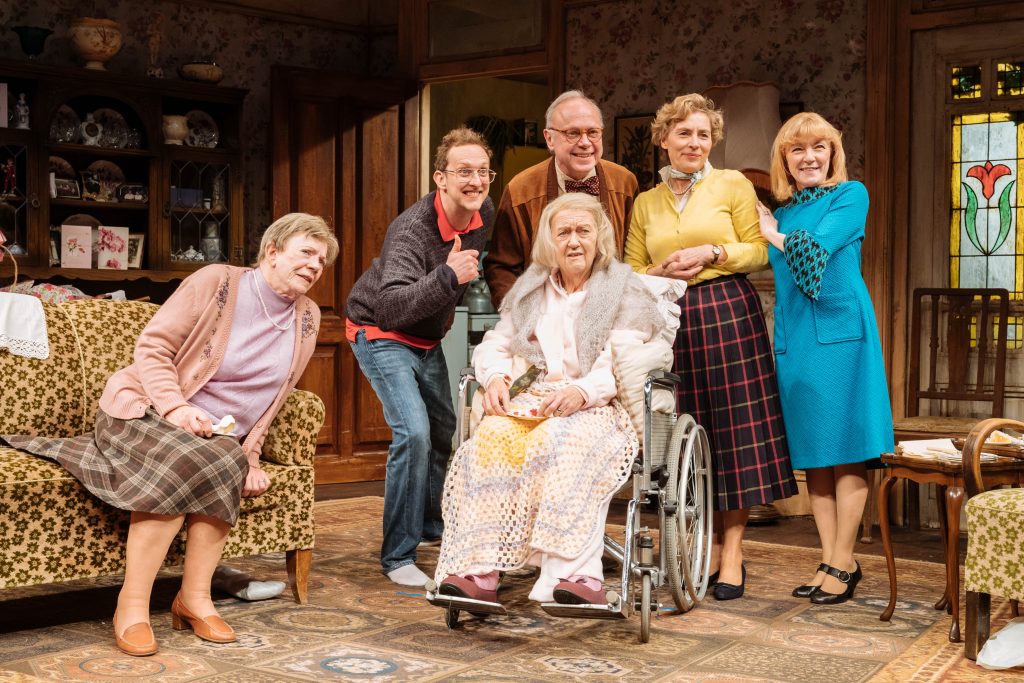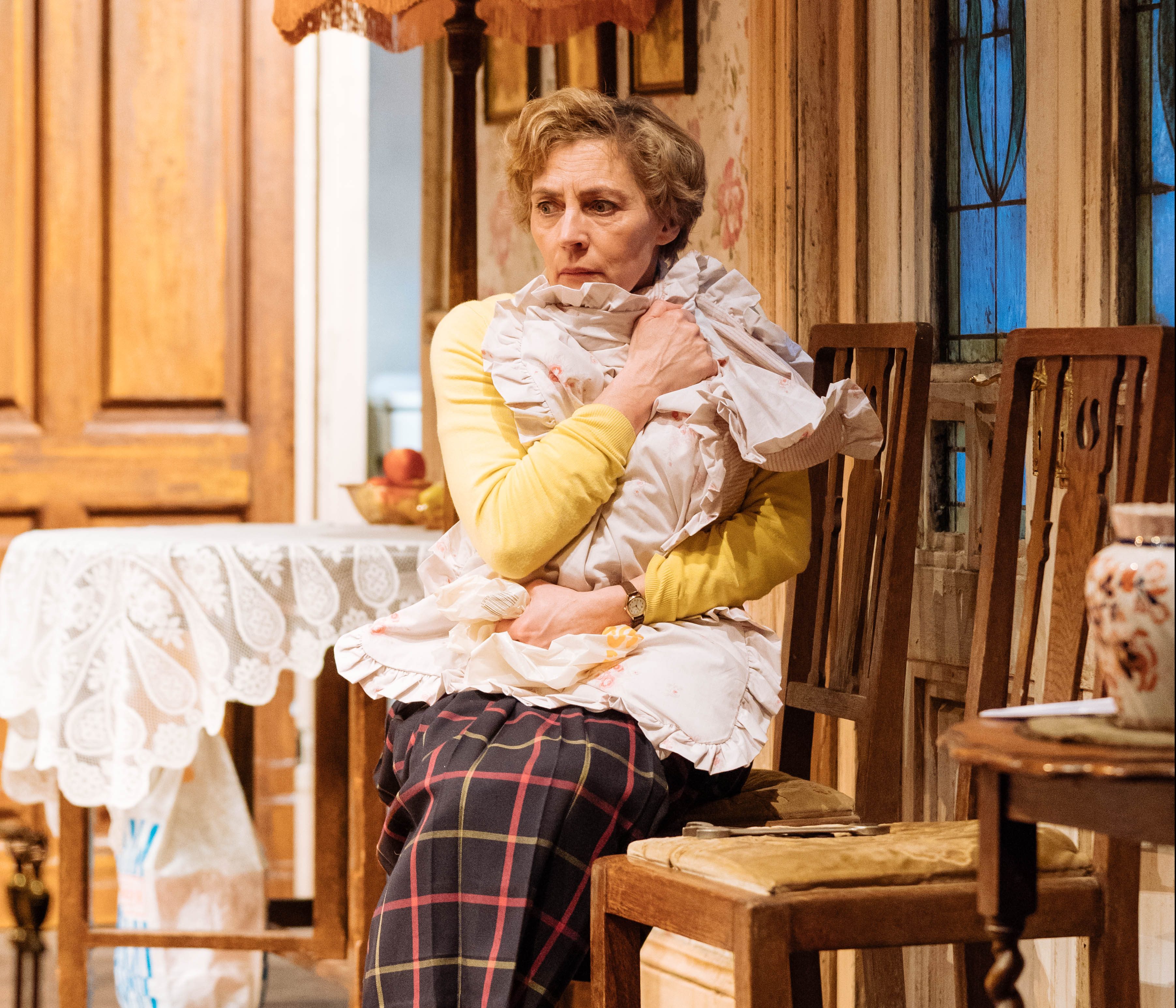Actress Saskia Reeves is known for the lengths she goes to get inside her roles. When she played a policeman in Silent Witness, she persuaded a barrister neighbour to set up a meeting with a CID detective, not a species usually known for chatting to the public. “It gave me lots of tiny little things to use in a very small part that made it sooo interesting for me,” says Reeves. “I love doing lots of ‘research’, in inverted commas. Whatever it takes to bring a character alive, I’ll do it.”
With her latest part, as Katherine in the 1987 play Curtains at the Rose Theatre in Kingston, Reeves has taken on a subject where the research is unusually close to home. Curtains is about dementia and the end of life, and how the younger generation cope with elderly parents in failing health.
It opens with strong-willed Ida, who is looked after at home by her grandson and an elderly neighbour. The family turn up for a rare visitation to celebrate Ida’s 86th birthday, but what follows is far from the cheerful tea party they had imagined, because Ida has asked her eldest daughter Katherine to help her to die. That request unleashes a chain of consequences for the family, painful and bleak, and darkly funny.
Really, funny? Can a play about dementia and the end of life be funny?
“Yes, that’s the first thing I wanted to say, that’s what’s so beautiful about it,” Reeves insists. “When you laugh at Who’s Afraid of Virginia Woolf by Edward Albee, that’s a dark comedy. You have a horrible, difficult situation, but it’s funny.”
Curtains playwright Stephen Bill has skilfully fleshed out every character, she says, and used them to set up moments of comedy.
Reeves is selective about which parts she takes on, but was drawn to Curtains by the quality of the script. “That’s my first priority, it’s if someone hands me a really good script – not just the character, but the way character is created by the writer.”
She has done her usual meticulous job of getting inside the skin of her own character. “If you met Katherine at a Christmas drinks or a parish council meeting you’d love her cakes and be impressed by her doilies, but I don’t think you’d like her shoes very much,” she says drolly. “She’s of her generation, lives in a very suburban part of Solihull. She was born in 1934, so she’d be the same age as my dad now.”

This is where Curtains gets personal for Reeves. Her dad is also an actor and his wise advice has been an influence on her life. “My dad once told me: ‘Twice as many women go to drama school as men, and there’s half as many jobs. You do the maths.’ So I went into the business knowing that if I could just stay off the dole, I was doing OK,” she told The Guardian a few years ago.
But now her dad is unwell, which is causing the family sadness and distress. So it says something for Reeves’s bravery as an actress that she’s ready to tackle Curtains, and for her motivation to look for the truth through her work. “My dad is 86, and when they offered me the job I was just trolling off to his 86th birthday,” says Reeves. “He has dementia, it’s a constant…” She breaks off.
“I think that’s one of the reasons why I wanted to do the play, because it’s such a close subject for me. Everyone I know of my generation now is wondering, talking about their parents and how they manage them.”
Katherine is called on in the play to do a terrible thing in helping her mum to die, so why would she do it? “She loves her mum,” says Reeves instantly. “And her mum is a very, very strong character, I think she has been under her mum’s thumb all her life. It has been painful to watch her mum, this really strong, determined woman, disintegrate.
Reeves has forthright views herself about assisted dying, partly because her own mother is Dutch. She admires the pragmatic and humane approach the Dutch take to the end of life, and is critical of the British fudge where helping people to die is both illegal and yet quietly practiced by doctors. It can leave desperately ill people at the end of their lives without the comfort of knowing there is an end to pain.
“In Holland it’s legal. In fact I think both my grandparents were helped to die when they were too old and ill to continue,” Reeves reveals. “But it’s something they talked about, and that was available.”
There was another factor which tempted Reeves to choose the play. “I grew up around here, in Twickenham,” says Reeves. “I went to school here, went to Kingston College of Further Education actually. I did French, English and Drama, and then dropped out basically and went to drama school. But this is my territory.”
I ask her if she thinks it will be OK to take my 11-year-old daughter to see the play. Her much-loved granny died of dementia last summer. Perhaps I’m being instinctively British, trying to protect my daughter from a painful subject when it would be better out in the open. Reeves encourages me to bring her.
“My daughter is 11 and she’s going to come, so I think it will be OK,” she says. “Maybe talk to her beforehand, to see. I hope you come out saying, ‘Cor, that was good. I enjoyed that. What an interesting, funny, sad evening.’”
Curtains runs at the Rose Theatre, Kingston, until March 17.







About The Author
Jenny Booth
Jenny was a news journalist for The Times. An ex-teacher, mum, gardener and art lover, there’s nothing she doesn’t know about the local culture scene…